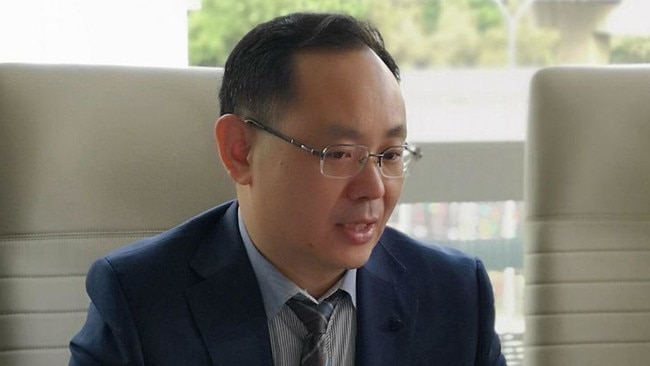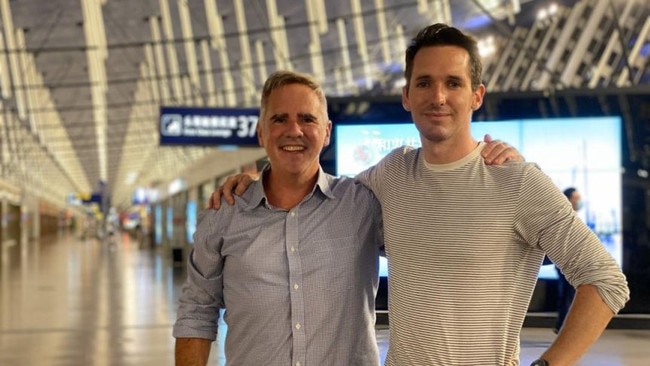Chinese state media journalist breaks silence about seven-hour ASIO raid
A Chinese state media journalist has broken his silence about a seven-hour ASIO search conducted in front of his young daughter in their Sydney home.

A Chinese state media journalist has broken his silence about a seven-hour ASIO raid conducted in front of his young daughter in their Sydney home.
Yang Jingzhong, who until leaving for China in August was the head of Sydney’s Xinhua News Agency bureau, said the encounter with Australia’s intelligence agency began at 6.30am on June 26.
“I was still asleep. There was a sudden knock on the door,” Yang wrote, in a Mandarin-language piece published by the Xinhua News Agency late on Tuesday.
When Yang opened the door to his Sydney apartment he found more than a dozen officers from the police and Australian Security Intelligence Agency, holding a search warrant and citing the federal government’s new foreign interference act.
“Although I was shocked, I quickly calmed down because I knew I had not violated any laws. However, my daughter had never experienced such a scene and was very frightened,” he wrote.
The account is the first by any of four state media journalists who were raided.
That the Chinese reporters — Yang, China News Service bureau chief Tao Shelan, China Radio International Sydney head Li Dayong and a second, still unnamed female reporter — were also the subjects of the ASIO investigation was revealed by Chinese state media after the ABC’s Beijing reporter Bill Birtles and Australian Financial Review’s Shanghai correspondent Michael Smith left China following a midnight visit by state security.
Neither Tao or Li have spoken publicly about the experience . Yang has declined The Australian’s requests for an interview.

ASIO does not comment on operational activity. A national security official noted that raids conducted in Australia require a warrant, in full accordance with Australian law.
In his account published by Xinhua on Tuesday evening, Yang said the entirety of the encounter was recorded.
“They did not miss any corner. They all took away my computer, mobile phone, iPad and other electronic equipment, as well as printed documents and other materials,” he wrote.
Yang said he was allowed to contact the Chinese Foreign Ministry, his employer Xinhua and the Sydney consulate, using a phone provided by the officers.
“They asked me not to use my mobile phone,” he said.
The officers, he said, told him to stay in the apartment during the raid. “I sat on the sofa in the living room with my daughter who was also awakened from sleep and watched them rumbling around. To go to the bathroom, some people followed outside the bathroom door,” he wrote.
Yang said he left Australia two months later. “My normal work and life in Australia were completely disrupted. Australia has never given a convincing reason or basis for why the raid was conducted,” he said.
Yang arrived as Xinhua’s Sydney bureau chief in February 2018, when bilateral relations between Australia and its biggest trading partner were already strained by Australian media reports about Chinese foreign interference.
The Turnbull government’s decision to ban Chinese telecom giant Huawei from the 5G network, its push back back on China’s military construction in the South China Sea and then the Morrison government’s call for an inquiry into the origins of COVID-19 all occurred during the Xinhua chief’s Sydney posting.
His final stories for Xinhua in Sydney included a piece on the Australian wine industry’s success, an interview with Australian National Farmers’ Federation president Fiona Simson about the importance of the China relationship to Australia’s farmers and one about the Australian lobster trade’s success in the Chinese market, which was published two days before the ASIO raid.
At the end of his personal account of the raid, Yang noted the increased strains in the bilateral relationship which he attributed to “some Australian politicians and media” who had become fixated on “so-called ‘foreign interference’’’.
“However, during my two-and-a-half years of work in Australia, I have also personally felt that the demand for economic and trade exchanges and cultural exchanges between the two countries is still strong, and China-Australia friendship has a solid foundation of public opinion,” he wrote.
“The prospects for friendly cooperation between the two countries remain bright,” he wrote.




To join the conversation, please log in. Don't have an account? Register
Join the conversation, you are commenting as Logout